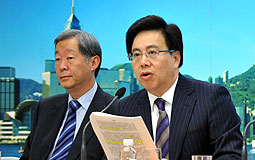
|
| Way forward: Lump Sum Grant Independent Review Committee Chairman Wilfred Wong briefs reporters on the recommendations to improve the grant subvention system. |
An independent body has made 36 recommendations to improve the Lump Sum Grant Subvention System in a report submitted to Secretary for Labour & Welfare Matthew Cheung.
Announcing the findings today, Lump Sum Grant Independent Review Committee Chairman Wilfred Wong said the system's principles are sound and worth retaining, such as its flexible resource deployment, streamlining administrative processes and enhanced accountability, and corporate governance.
However, he noted the recommendations aim to address stakeholders' concerns, such as non-government organisations' (NGOs) financial issues, corporate governance, the relationship between snapshot (those joining the social worker rank before April 2000) and non-snapshot staff, workload increases, salaries, training support, service development and overseeing of the system's implementation.
"We sincerely hope our recommendations can help perfect the system and can motivate all stakeholders to work closer together to enhance service quality," Mr Wong said.
Praising the committee's hard work and NGOs' and staff's support and participation, Mr Cheung said the Government will study the report in detail and make a full response in one to two months.
The committee suggests six guiding principles - enhanced partnership among stakeholders, flexible deployment of financial and human resources, adequate monitoring of NGOs, enhanced NGO accountability, closer communication among stakeholders especially between the management of NGOs and staff, and a mindset for change.
Main proposals
The committee's major recommendations are:
* for the Government to provide an actuarial service for NGOs to assess their ability to meet their commitments to snapshot staff, and to encourage NGOs to make effective deployment of their reserves, such as to enhance staff remuneration packages and support staff development initiatives;
* for the Social Welfare Department to thoroughly review its audit procedures to ensure they are effective in monitoring the use of public funds and do not compromise NGOs' flexibility, and to streamline its financial reporting requirements;
* for the Government to form a $1 billion social welfare development fund to support training, capacity enhancement initiatives and studies on enhancing NGOs' service delivery;
* for the Lump Sum Grant Steering Committee to work with the welfare sector to develop a best-practice manual for NGOs on management issues, with professional input from management experts if necessary;
* for NGOs to spend the additional funding provided in line with civil service salary adjustments solely on staff in subvented services, and fully deploy the provident fund provisions and reserves for non-snapshot staff on provident fund contributions;
* for the Government to institute a review mechanism to oversee the systematic review of welfare services and ensure stakeholders' views are considered in the review process;
* for the Government to form an independent complaints handling committee to determine on lump sum grant-related complaints which have failed to be satisfactorily addressed at the NGO level, recommend improvements to the steering committee and report to Director of Social Welfare for follow-up action;
* for the Government to reconstitute the steering committee to enhance its role and composition to comprise not only the existing stakeholders, but also independent members of the community;
* for the department to set up a help desk to provide management advice for small NGOs and to facilitate their collaborative efforts, and to make available additional resources to strengthen their administrative and professional support;
* allowing small NGOs to apply for grants up to $300,000, or 10% of its grant, each year for a total of four years; and,
* for the department, in response to the labour market situation, to provide additional resources for three years to NGOs which need to hire paramedical staff or their services, so they can offer more competitive salaries to recruit and retain these staff.
Since the subvention system's inception the provision for subvented NGOs has risen 36% from $5.9 billion in 2001-02 to $8 billion in 2008-09.
During the review, the committee received 133 written submissions, met 112 stakeholder groups and commissioned a consultancy study on five overseas welfare-funding models.
Click here for the review report, the written submissions and the consultancy study report.
|